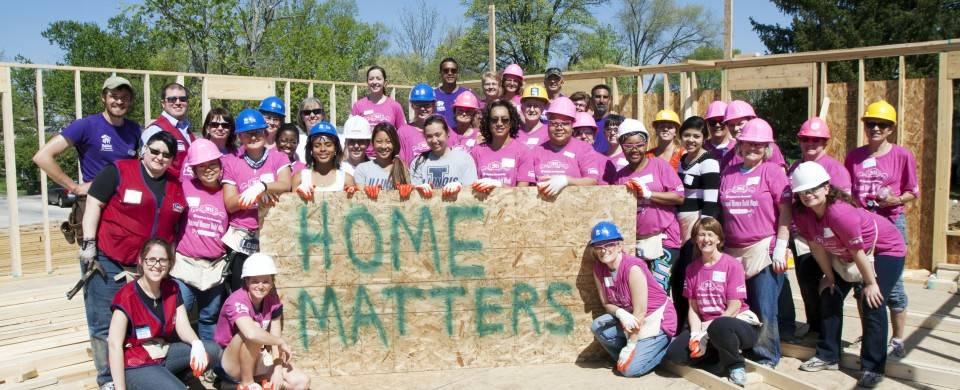In Champaign County, Habitat for Humanity is known for its fantastic ReStore and also for providing housing to individuals and families that otherwise could not afford homes. Currently, the Christian housing ministry is launching a new program in which an interfaith coalition of religious groups from Champaign County will share the responsibility of building and raising funds for two new homes in Urbana.
Habitat homes benefit individuals and families that cannot qualify for traditional mortgages. Kim Gollings, Habitat’s Volunteer Coordinator, said that these individuals “work full time, have done a great job taking care of their credit, but still fall below the income gap.” Habitat homes have a 0% interest rate and are typically appraised at around $100,000. After insurance and taxes, the average monthly cost of a Habitat home is $550.
“That’s less that a lot of people are paying in rent,” Gollings pointed out.
There are three basic criteria to qualify for a Habitat home: the ability to pay back a loan, the willingness to partner with Habitat, and presently living in an area that is unsupportable for that individual’s or family’s life. “Maybe the a family is living in Section 8 housing,” said Gollings, “or lives in an area where their children cannot play outside, or where utility costs are outrageously high.”
To date, Habitat has supported the building of nearly ninety homes in Champaign County. Next year is the organization’s 25th anniversary, and its goal is to finalize the building of its 100th home in celebration.
Typically, Habitat homes are built with the support of one faith group. Habitat partners with all faith groups; its goal is to serve people of all faiths or no faith at all. However, Gollings explained that the usual model is that a single faith, perhaps across multiple congregations, will work together on a housing project.
The Interfaith Build model emerges from Habitat’s mission to bring the community together to build respect and unity.
“Habitat has shown that when people of different faiths come together, there is a new sense of respect for one another and what we’re all trying to accomplish in this lifetime,” said Gollings.
So far, roughly twenty faith groups have shown initial interest in participating in the Interfaith Build, among them the Illini Hillel, the Central Illinois Mosque and Islamic Center, and many Champaign County Christian churches.
The next step is to convene these groups on August 10th to begin the planning process for the ceremonial kickoff, which will take place on September 11th. This ceremonial kickoff, with the faith groups will plan together, will highlight the interfaith identity of the coalition.

A “building blitz” will take place in the fall, during which the groups will rough-frame and weather-proof the two homes for the winter. Next, the faith groups will spend the winter months fundraising for the project, and finally they will finish the two homes in the spring.
The money that the groups raise will be released to Habitat at the end of the build, so Gollings pointed out that faith groups to not need to have money up front for the project. Habitat does require a financial commitment from participating groups, but no specific dollar amount is required.
Gollings said that while Habitat has reached out to all of the faith groups it is aware of, the organization is still hearing about other groups that might be interested in participating in this project.
“If anyone is involved in a group that has not been contacted, we hope they will reach out to us so we can share information about the Interfaith Build,” she said.
Habitat for Humanity is still seeking commitments from faith groups that may be interested in participating in the Interfaith Build. For more information, contact the organization here.








